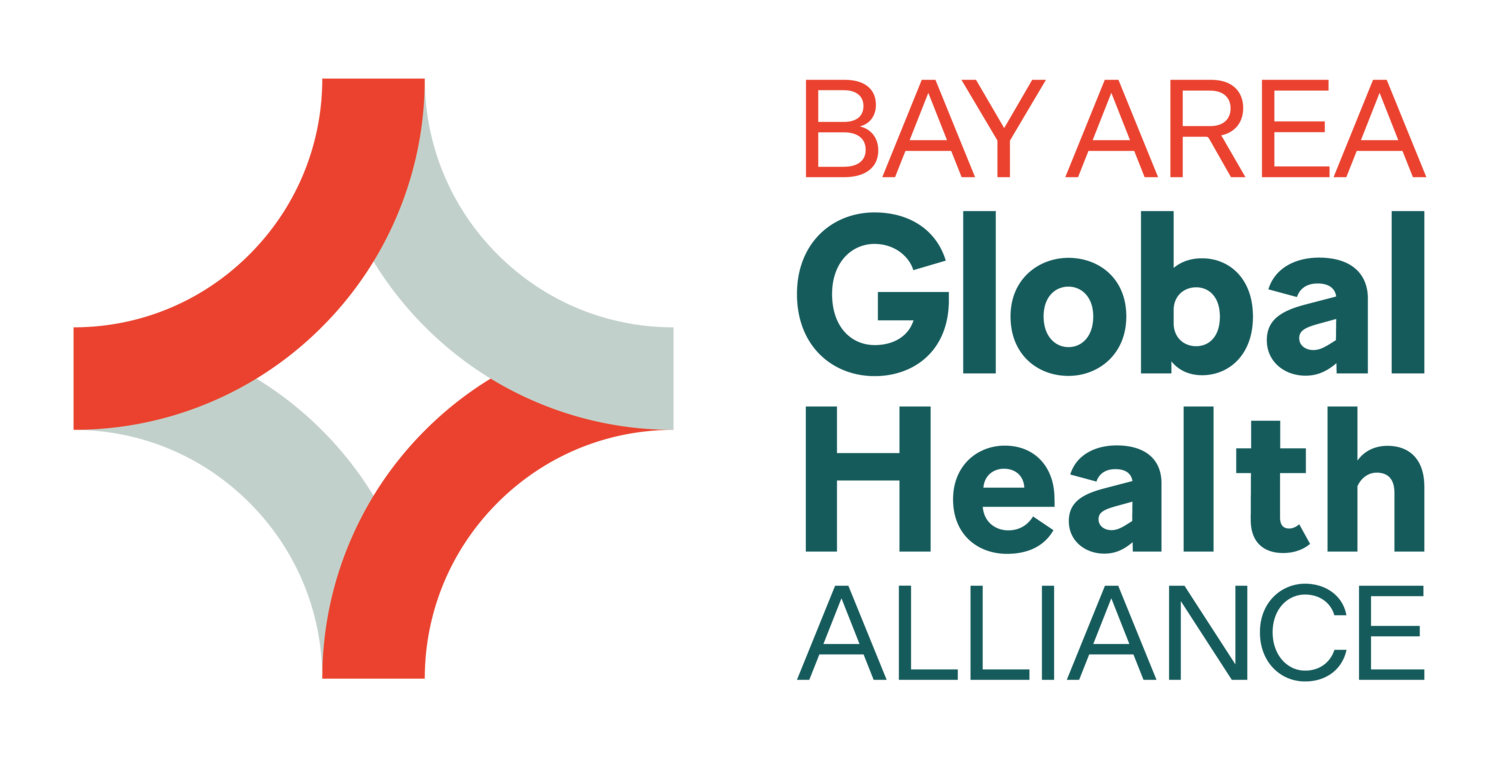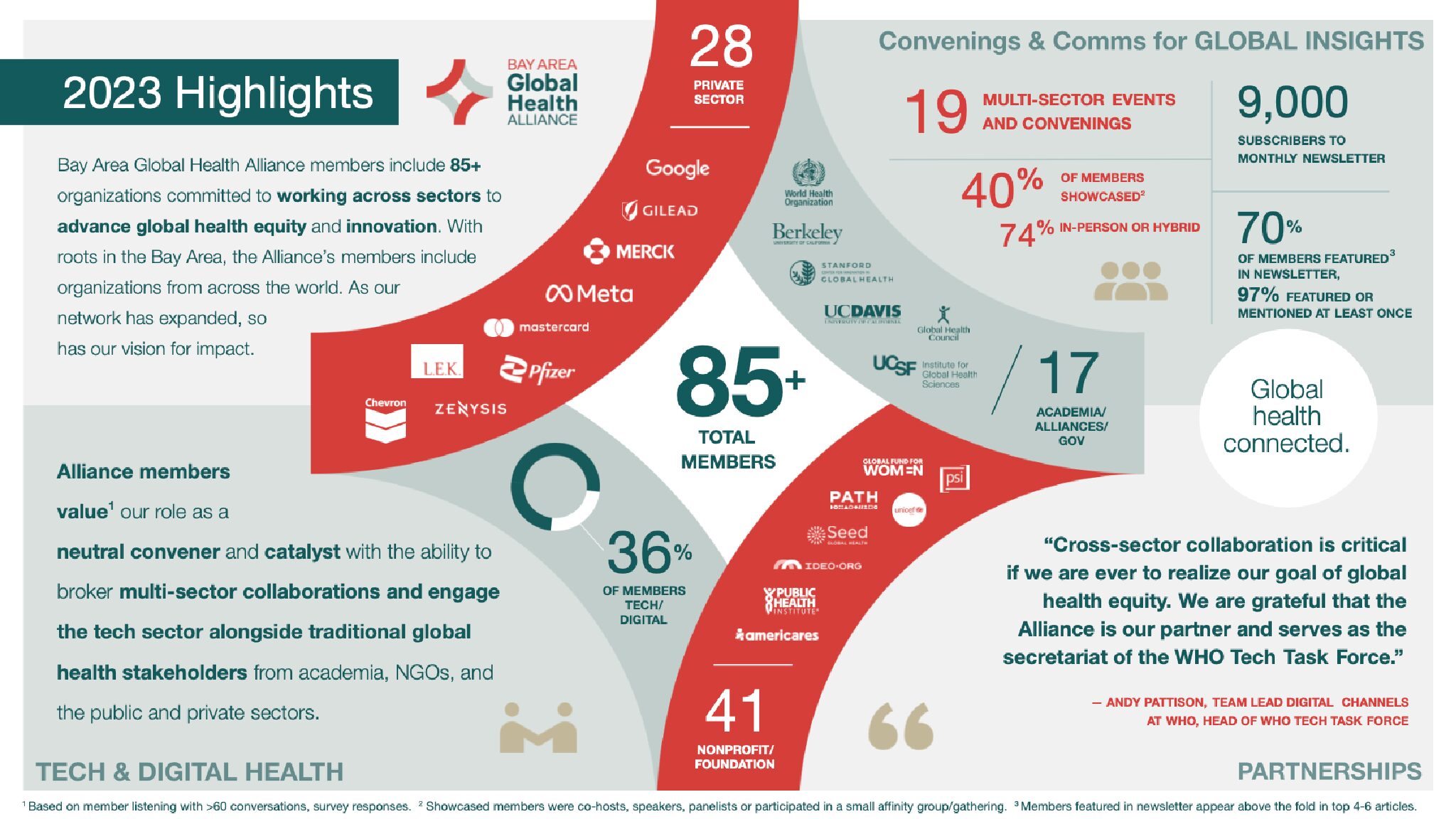As 2023 comes to a close, we reflect on what the Bay Area Global Health Alliance has accomplished, how we have shifted to meet the moments and our members’ needs, and where we need to go to advance global health equity and innovation.
Our theory of change is based on the assumption that collaboration across multiple sectors, geographies, and areas of expertise is necessary to solve today’s complex global health challenges. We believe in the catalytic power of shared knowledge and multi-sector cooperation and that, together, we can shift what is possible and achieve better and more sustainable health outcomes for all.
Global leaders are acknowledging how partnerships accelerate systems change. The power of cross-sector collaboration, the need for *field catalysts to broker effective partnerships, the necessity of neutral conveners for candid, multidirectional dialogues, the call for community-led solutions, and the absolutely essential element of trust are the building blocks of transformation. From Alphabet to the World Economic Forum, from the Harvard Business Review to the Africa CDC, their perspectives on collaboration validate what we believe and make our collective work together even more valuable, exciting, and relevant in our challenging times.
When we began the Bay Area Global Health Alliance in 2020, our mandate was to connect various global health stakeholders based in the Bay Area and build a local community patterned after other regional alliances, like the Washington Global Health Alliance. Then, the pandemic changed everything. It reaffirmed the need for partnerships, and we expanded our outreach globally. As inequities were laid bare, the growing call for locally led solutions and shifting power dynamics led us to be more intentional about seeking voices and partnerships from low- and middle-income countries (LMICs). The pandemic also accelerated exponentially the tech sector’s work in global health and our work connecting the tech sector with traditional global health stakeholders.
In 2022, we listened to members say that they valued: being part of a trusted multi-sectoral network with a shared vision of health equity; access to experts, bespoke matchmaking, and curated convenings; our role as a catalyst of novel partnerships and engaging with the tech sector and its innovation ethos; and the communications platforms to showcase and amplify their individual and collective work. In 2023, we challenged ourselves to do more — to deepen our collective impact and be more intentionally inclusive.
2023 Highlights | Deepening Impact, Raising Visibility, Building Trust
This year has been about exploring how we might leverage our network to improve health outcomes and advance health equity and innovation while continuing to provide value for our members. Here are a few highlights and previews of what’s to come.
1. LMIC Partnership Strategy: With a commitment to locally led development, we explored how we might add value and support our members in advancing and elevating LMIC partners and leaders whose innovation mindset, understanding of local cultures, structures, and partners, and ability to leapfrog technology offer exciting opportunities for partnership and collaboration. Accenture ADP supported our exploration and made recommendations in the realm of advocacy, partnership brokering, and serving as a neutral convener for nuanced conversations. Currently, 10% of our members are LMIC-based, and we are working to increase that percentage in 2024. More than 60% of our convenings featured speakers from LMICs, and 80% had LMIC participants. We also have increased our engagement with the Africa CDC and the Africa HealthTech Summit, for which we served as a thought partner, and Salient Advisory, which has African health tech as a focus area. Further, we participated in the HealthTech Hub Africa’s Investor Summit and featured Africa CDC’s Chief Digital Advisor Jean Philbert Nsengimana as our keynote speaker at our Annual Meeting (watch here). These activities represent our initial efforts.
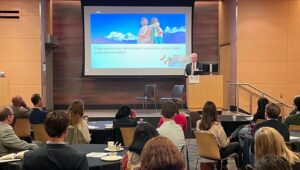
Alliance Board Chair, Colin Boyle welcomes members to the Alliance’s annual meeting.
2. AI and Global Health: Likely the most disruptive and transformative innovation of our time, GenAI is a priority for many of you and questions about its applicability, the mechanics of integration, safety, and equity are top of mind. AI in Global Health was featured at our Annual Meeting in June with a panel discussion with members (watch here and learn more). To explore and understand this dynamic field, in 2024, the Alliance will be launching a Discussion Series on AI and Global Health, which will start by profiling a range of use cases to highlight how members are augmenting their efforts through this rapidly evolving technology.
3. Antimicrobial Resistance (AMR) Innovative Approaches and Financing: Service delivery solutions to curb AMR are capital-intensive and require longer time horizons than what grant funders are currently willing to provide. With the goal to scale effective approaches, the Bay Area Global Health Alliance and board experts from PATH, UC Berkeley, and L.E.K. Consulting have developed a concept focused on the need for new, diversified sources of capital to enable country-driven solutions. In partnership with country stakeholders and global partners, we are exploring the co-creation of an outcomes-based financing (OBF) mechanism to incentivize antimicrobial stewardship efforts, specifically in LMICs. More on this to follow in 2024.
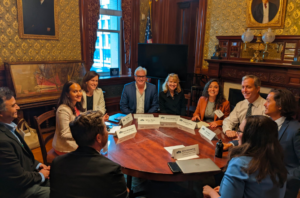
Alliance’s Executive Director, Sara Anderson, sits at the White House Roundtable on AI and Health with Kamal Menghrajani, White House Fellow; Helen Dilg, Open AI; William Weeks, Microsoft; Amarynth Sichel, USAID; Brian Wahl, Johns Hopkins; and Erica Kimmerling, White House Office of Science and Technology Policy.
4. White House Roundtable on AI and Health: The Alliance was honored to join a distinguished group of leaders from across sectors at the White House Roundtable on AI and Health on October 3 in Washington, DC. The White House Office of Science and Technology Policy convened 25 experts and stakeholders to discuss how artificial intelligence (AI) can be safely deployed to improve health outcomes, with a special breakout session on the use of AI to improve public health and global health. Alliance members and partners provided input in advance. The collective “ABC” priorities for AI and global health include access, the basics (infrastructure), community-driven, data safety, equity, framework transformations, and governance. Learn more.
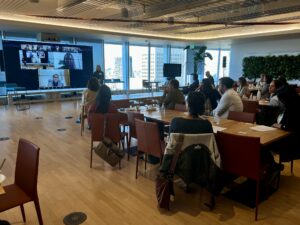
Alliance Board Member, Krista Donaldson welcomes lightning talk speakers at the Alliance’s Insights on Implementation for Equity event.
5. Insights on Implementation for Equity: Too often, promising health interventions do not reach the world’s most vulnerable or are not effectively adapted to community needs and constraints. This frequently results in unmet critical needs and growing health inequity despite significant investment in addressing these issues. With funding from Gilead Sciences, in 2023, the Alliance set out to better understand this problem and propose practical solutions to close the gap between what we know and what we do, using the lens of implementation science to advance health equity. Nearly 150 stakeholders participated in this project and its convenings. An insights report (in progress) will include a summary of opportunities for further exploration and proposed action for next steps. Read more on our website and in the pre-read.
6. WHO Tech Task Force: We continue to serve as secretariat of the World Health Organization’s Tech Task Force. Our collaboration with the Task Force of 30+ tech members enables regular engagement with the tech sector and increases opportunities for collaboration across our members and LMIC partners. Led by WHO Digital Channels Lead Andy Pattison, our next convening will focus on the emergency situation in Gaza and how the tech community might be best positioned to provide support.
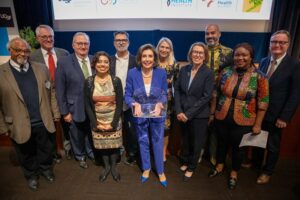
U.S. House of Representatives Speaker Emerita Nancy Pelosi stands with Eric Goosby, UCSF; Colin Boyle, Bay Area Global Health Alliance Board Chair; George Rutherford, UCSF; Monica Gandhi, UCSF; Mike Shriver; Diane Havlir, UCSF; Mary Pittman, Bay Area Global Health Alliance Board Chair Emerita/Public Health Institute; Tyler TerMeer, SF Aids Foundation; Olofunke Fasawe, UCB PhD student; and UCSF Chancellor, and Sam Hawgood.
7. First Bay Area Global Health Alliance Leadership Award — Speaker Emerita Nancy Pelosi: Together with Alliance members the University of California San Francisco, Public Health Institute, and Friends of the Global Fight Against AIDS, Tuberculosis and Malaria, as well as the San Francisco AIDS Foundation, the Alliance awarded Nancy Pelosi the first Bay Area Global Health Alliance Leadership Award for her steadfast stewardship in addressing HIV/AIDS and her contributions to advancing global health and equity throughout her career. The October invitation-only event brought together Alliance leaders — across academia, tech, foundations, nonprofits, and the private sector — who have all been shaped and inspired by Pelosi’s activism and achievements in the field. Learn more.
While it’s been an exciting year with new initiatives, new members, and new collaborations to increase our collective impact, our core tenants remain the same. The Alliance remains committed to working together to seed, broker, and foster relationships that help our members advance global health equity and innovation. We continue to serve as a neutral convener and catalyst, connector, communicator, and broker of novel partnerships to harness technology, research, development, and delivery of health care for all.
-
Trusted network. Our trusted, cross-sector network grew to 85+ members, providing more opportunities for connections, collaboration, and shared learnings across disciplines and sectors. More than 35% of our members have a tech or digital health focus, 40% are based in the Bay Area, 33% are private sector partners, and 10% are based in LMICs.
-
Shared learnings. We held 19 cross-sector events and convenings designed to reflect your challenges and opportunities. More than 800 people joined us, and 40% of your organizations were showcased. Global health innovative financing, maternal health optimizing safe deliveries, Africa health tech for supply chains, and implementation science for equity were just some of the topics. Many of you also joined us at our member meet-up at UNGA and at small group dinners — and made new Alliance connections at major conferences around the world.
-
Communications. We continue to amplify our members’ global health news to share global insights and promote connections between members on our website and monthly newsletter. The Alliance Connections Newsletter, with 9,000 global subscribers, is a comprehensive, curated round-up of our members’ global health news. It has served to spur new partnerships, attract new members to the Alliance, and provides a trusted source of reliable, timely content to enable better global health decision-making for leaders who wear a global health hat but may not work for global health organizations.
-
Leadership. We are led by an engaged Board of Directors, composed of 20 multi-sector leaders who are all experts in their fields, senior leaders in their organizations, and, together, bring decades of experience accelerating and scaling new initiatives to improve health outcomes for millions, as well as cutting-edge research, analysis, and field experience tackling some of our most pressing global health challenges. The Secretariat also brings together decades of global health experience in business, nonprofit management, communications, partnership development, and advocacy. As the Secretariat is a lean team, the hands-on nature of the Board of Directors has played a significant role in the Alliance’s growth and ability to deepen its impact.
A Final Word
Of our many accomplishments in 2023, perhaps the most gratifying recognition for the Alliance was being described as the “hygge” for global health.
A Danish term, hygge embodies creating a warm atmosphere and enjoying life’s pleasures with good company. The Bay Area Global Health Alliance was established with the idea of creating a trusted community that transcends boundaries, uniting individuals and organizations from diverse sectors, breaking out of our silos and across sectors and geographies, and working together to bring innovation and equity to improve the health of people around the world. Being acknowledged as the hygge for global health is an honor, signaling that we are achieving our mission by building a global health family capable of impactful accomplishments. In 2024, we are excited to embark on a new three-year strategy, and we will look to many of you for your input, ideas, and guidance. Thank you for a remarkable year, for your invaluable partnership, and for helping us earn your trust.
* “Field catalysts focus on massive impact by building, strengthening, and coordinating relationships across actors throughout the ecosystem.” From Funding Field Catalysts from Origins to Revolutionizing the World, by Bridgespan in collaboration with the Skoll Foundation, March 2023.
